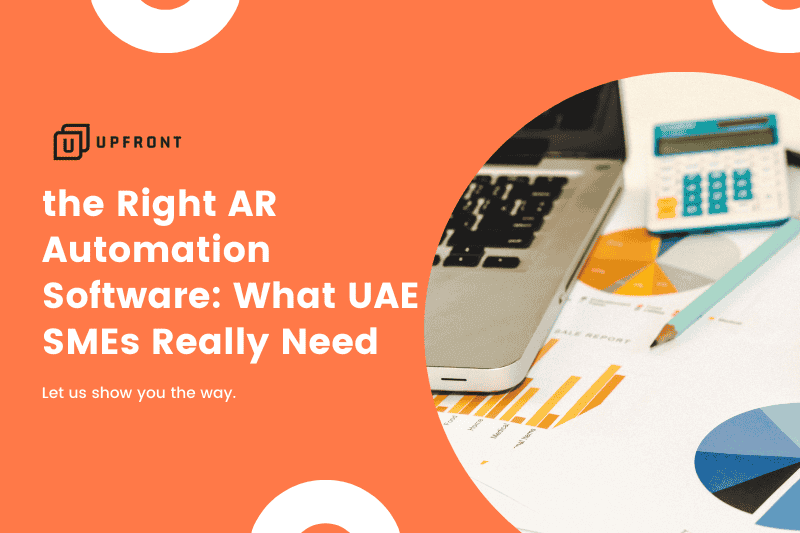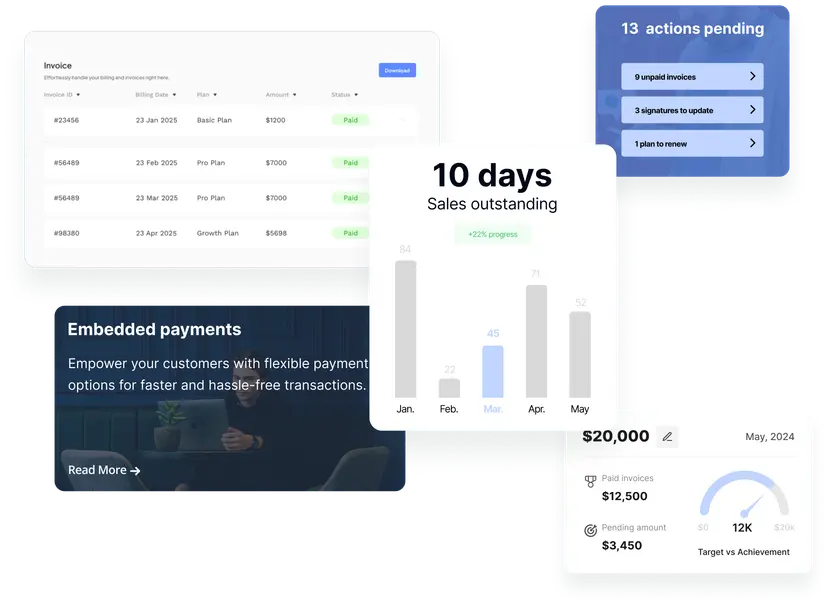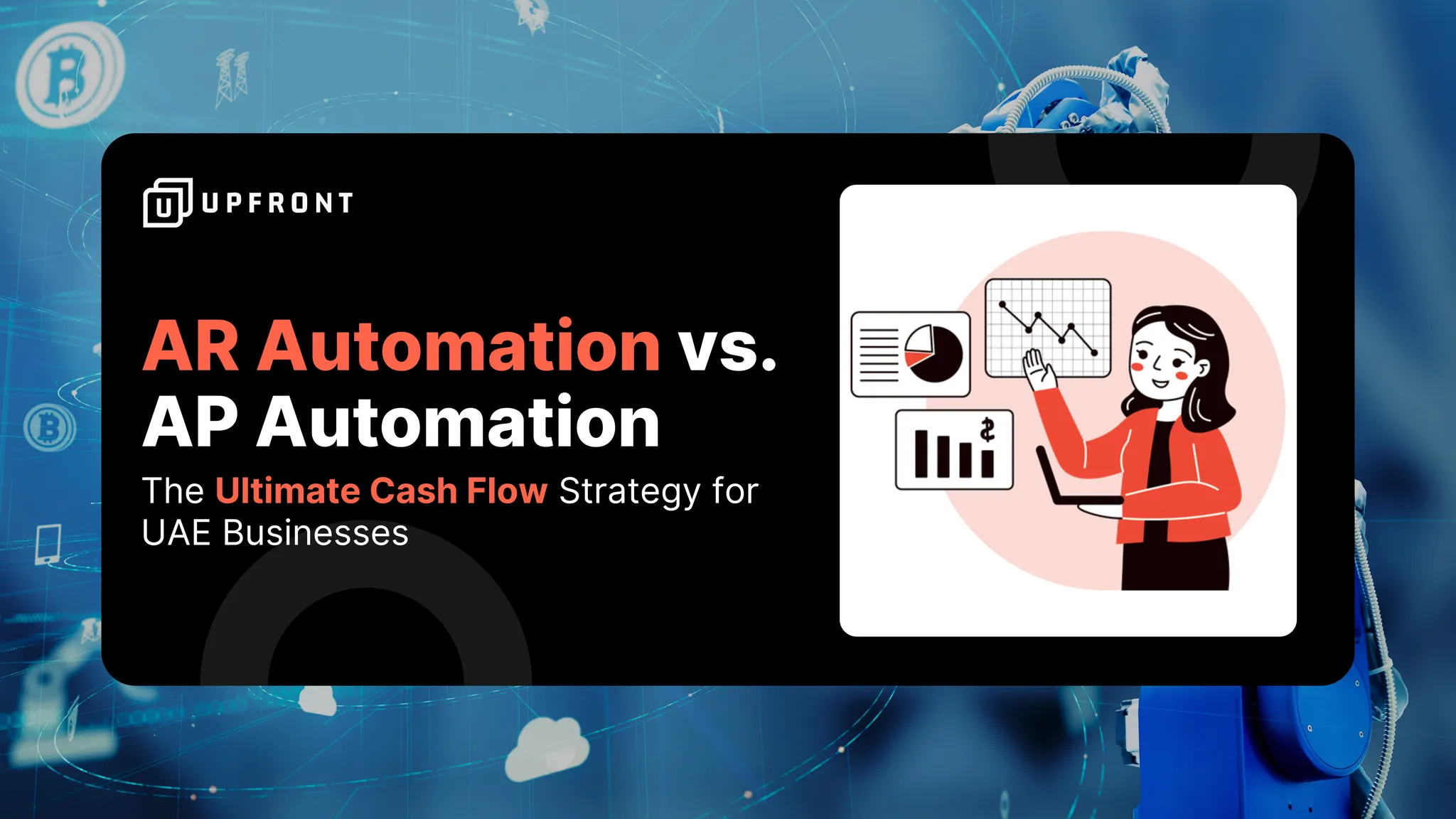How to choose the Right AR Automation Software in the UAE
What Are the Top AR Automation Challenges in UAE/GCC?
- Delayed Payments: Are late or overdue invoices consistently impacting your cash flow?
- Manual Overload: Is your finance team spending excessive time on manual invoice creation, sending reminders, and chasing payments?
- Invoice Accuracy: Do errors in invoices lead to disputes, payment delays, and strained customer relationships?
- Integration Gaps: Does your current AR process struggle to connect smoothly with your existing SME accounting software Dubai (like QuickBooks, Xero, Zoho Books, or local ERPs)?
- Compliance Concerns: Are you confident your invoicing process consistently meets UAE VAT compliance regulations?
- Reporting Blind Spots: Do you lack clear visibility into key AR metrics like Days Sales Outstanding (DSO) or customer payment trends?
- Payment Friction: Is it difficult for your customers to pay you quickly and easily through modern methods?
Which Features Define the Best AR Automation Software in UAE?
1. Seamless Automated Invoicing (Dubai Ready & VAT Compliant)
- Look For: Capabilities to generate professional, customizable invoices automatically, potentially pulling data directly from sales orders or CRM systems. Crucially, it must have built-in logic for UAE VAT compliance, ensuring correct tax calculations and inclusion of all mandatory information. Features like automated sending via email or secure customer portals, easy setup for recurring billing (subscriptions/retainers), and strong integration with your primary accounting system are vital for automated invoicing Dubai.
- Why It Matters: This saves significant time, drastically reduces costly errors, ensures compliance, accelerates the billing cycle, and presents a more professional image to your clients.
2. Intelligent Automated Reminders & Collections Management
- Look For: Highly configurable reminder workflows (e.g., pre-due date nudges, on-due date alerts, post-due date escalations). Customizable email templates that maintain your brand voice. Automated escalation paths for seriously overdue accounts. A transparent audit trail of all communications sent and received. Seamless integration with payment options is key.
- Why It Matters: This directly accelerates payment collection (lowering DSO), frees up your team from manual chasing, ensures consistent communication, and helps maintain positive customer interactions during the collections process.
3. Integrated & Secure Online Payment Processing UAE
- Look For: Direct integration with popular payment gateways prevalent in the UAE and GCC (supporting credit/debit cards, bank transfers, and potentially digital wallets). The ability to embed secure payment links or buttons directly within invoices and reminder emails (online payment processing UAE). A secure, self-service customer portal for viewing invoices and making payments. Support for setting up recurring payments automatically. Adherence to the highest security standards like PCI DSS is non-negotiable.
- Why It Matters: This removes friction from the payment process, significantly speeds up cash inflow, enhances customer convenience, and meets modern expectations for digital transactions.
4. Automated Cash Application & Reconciliation
- Look For: Software that automatically matches payments received (via bank feeds or payment gateways) to the correct open invoices, even handling complexities like partial payments, overpayments, deductions, or credit notes. It should automatically update customer balances and sync reconciliation data back to your main accounting system.
- Why It Matters: This dramatically reduces manual reconciliation effort, improves accuracy, minimizes errors, and provides a real-time, accurate view of your receivables status.
5. Insightful Reporting & AR Analytics
- Look For: User-friendly dashboards presenting key AR metrics (DSO, Aged Debtors, Collection Effectiveness Index – CEI) in real-time. Customizable reports on collection activities, customer payment behaviour analysis, and cash flow forecasting capabilities. The ability to drill down into specific customer accounts or invoice details.
- Why It Matters: This empowers informed decision-making, helps identify potential risks or opportunities proactively, allows you to measure the effectiveness of your AR strategies, and demonstrates the ROI of your automation investment.
6. Robust Integration Capabilities
- Look For: Pre-built connectors or robust APIs for your specific SME accounting software Dubai (QuickBooks, Xero, Zoho Books, Sage, Microsoft Dynamics, local ERPs). Clear documentation and support for setting up and maintaining these integrations. Reliable, bi-directional synchronization of customer data, invoices, payments, and reconciliation status.
- Why It Matters: This eliminates data silos, prevents duplicate data entry, ensures data consistency across systems, streamlines end-to-end financial workflows, and maximizes the value of both your AR and accounting software.
Ready to Transform Your UAE Cash Flow?
GetUpfront’s AR automation guarantees FTA compliance, reduces DSO by 45%, and unlocks trapped cash. Discover the right AR software for UAE businesses.
Book Your UAE-Optimized Demo →Cloud AR Software GCC vs. On-Premise: The Clear Choice for SMEs
- Cloud Benefits: Lower upfront investment (subscription-based), automatic software updates and feature enhancements, accessibility from anywhere with an internet connection, easy scalability as your business grows, and the provider manages security, backups, and infrastructure maintenance.
- On-Premise Challenges: Requires substantial upfront capital expenditure, necessitates internal IT resources for installation, updates, and maintenance, limits accessibility, and scaling can be complex and costly.
Understanding AR Software Pricing Dubai
- Number of users accessing the system.
- Volume of invoices processed or number of active customers.
- Specific features included in the plan (basic vs. advanced tiers).
Making the Final Decision: How to Choose AR Software UAE
- Request Personalized Demos: Schedule live demonstrations tailored to your business processes. Ask specific questions related to your pain points and workflows.
- Utilize Free Trials: If available, take advantage of free trial periods. Test the software with real (or realistic sample) data to assess its usability and effectiveness.
- Check Local References & Reviews: Look for testimonials or case studies from other SMEs in the UAE or GCC. What are their experiences?
- Evaluate Support: Consider the availability and quality of customer support, especially during local business hours.
FAQs – Choosing the Right AR Automation Software in the UAE
1. What is AR automation software and why is it important for UAE businesses?
AR automation software streamlines invoicing, payment collection, reconciliation, and cash flow reporting processes. For UAE businesses, choosing the right AR automation tool ensures VAT compliance, speeds up collections, and supports dynamic receivables financing, which is critical for maintaining healthy cash flow in competitive GCC markets.
2. What features should the right AR automation software in the UAE include?
The best AR automation software in the UAE must offer:
- AI-driven invoice generation
- Real-time receivables tracking
- VAT-compliant e-invoicing
- Integrated payment gateways with local banks
- Automated reconciliation
GetUpfront’s platform includes all these features tailored to UAE regulatory and banking frameworks.
3. How does AR automation improve cash flow for UAE companies?
By reducing Days Sales Outstanding (DSO), improving payment predictability, and automating reminders, AR automation software in the UAE enhances cash conversion cycles. GetUpfront also offers embedded finance options, letting businesses unlock cash tied in receivables faster. key for Benefits of AR Automation UAE.
4. Is AR automation software scalable for growing UAE enterprises?
Yes. The right AR automation software for UAE businesses can scale as transaction volumes, customer bases, and payment methods expand. GetUpfront’s modular design allows UAE firms to start with core automation and add features like embedded payments and financing as they grow.
see Cash Flow Automation UAE 2025 for regulatory shifts
5. Why choose GetUpfront as your AR automation software provider in the UAE?
GetUpfront uniquely delivers AR automation software in the UAE with:
- Full Arabic and English invoicing support
- UAE VAT and e-invoicing compliance
- Local bank API integrations
- Receivables financing and embedded payments
- Real-time dashboards for cash flow visibility
This makes it the ideal choice for UAE and GCC enterprises seeking reliable, scalable AR automation solutions.
→ Cash flow mastery: AR Automation vs. AP Automation
→Transform efficiency: AR Automation Industry Impact
→ Next-gen processing: Future of AR Automation
→Seamless adoption: Integrating AR Automation
→ Eliminate bottlenecks: AR Automation Showdown 





